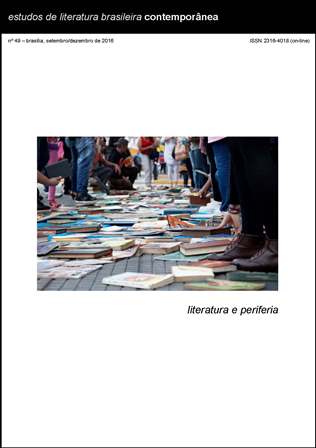Da margem à multidão:
a centralidade e o êxodo dos pobres
DOI:
https://doi.org/10.1590/2316-4018496Abstract
Com este artigo, buscamos problematizar a percepção da chamada “escrita periférica” como um delineamento cultural e linguístico que se confronta com um “centro” ou um “circuito hegemônico” ao qual a periferia deveria ser, uma vez superados os antagonismos, “incluída”. Tendo em vista o conceito de multidão oferecido pelos pensadores Hardt e Negri, propomos, ao contrário, uma subversão desta relação centro/periferia, dando ao pobre e à literatura marginal uma centralidade não em relação a um outro delineamento periférico qualquer, mas enquanto paradigma de uma produção linguística marcada por linhas de resistência a um só tempo comunitárias, em rede e sincréticas.
Downloads
References
ARIAS, Alejandro Reyes (2011). Vozes dos porões. Tese (doutorado em hispanic languages and literatures) ”“ University of California, Berkeley.
BIFO, Franco Berardi (2012). The uprising: on poetry and finance. Los Angeles: Semiotext(e) Intervention Series.
CANCLINI, Néstor Garcia (2008). Culturas híbridas: estratégias para entrar e sair da modernidade. São Paulo: Editora da Universidade de São Paulo.
DELEUZE, Gilles; GUATTARI, Félix (1997). Mil platôs: capitalismo e esquizofrenia v. 5. São Paulo: Ed. 34.
FELTRAN, Gabriel (2015). Disputa política nas periferias passa cada vez mais longe da polarização esquerda versus direita, diz pesquisador da USP. Entrevista a Marina Amaral. Opera Mundi, São Paulo, 20 jul. On-line. Disponível em: <http://goo.gl/zFiSVt>. Acesso em: 24 ago. 2015.
FERRÉZ (2013). Capão pecado. São Paulo: Planeta.
FERRÉZ (Org.) (2005). Literatura marginal: talentos da escrita periférica. Rio de Janeiro, Agir.
FOUREAUX, Francisco (2014). #ResisteIsidoro. Farol: Revista de Estudos Organizacionais e Sociedade, Belo Horizonte, n. 2, p. 667, dez.
GUATTARI, Félix; ROLNIK, Suely. Micropolíticas: cartografias do desejo. Petrópolis: Vozes, 2010.
HARDT, Michael; NEGRI, Antonio (2005). Multidão: guerra e democracia na era do Império. Rio de Janeiro: Record.
HARDT, Michael; NEGRI, Antonio (2006). Império. Rio de Janeiro: Record.
MARGINAL (2012). Poesiaviralata. Blog. Belo Horizonte, 15 fev. On-line. Disponível em: <https://goo.gl/GJy8by>. Acesso em: 26 jan. 2015.
NANCY, Jean-Luc (1996). Être singulier pluriel. Paris: Galilée.
NASCIMENTO, Érica Peçanha do (2009). Vozes marginais na literatura. Rio de Janeiro: Aeroplano.
NASCIMENTO, Érica Peçanha do (2014). Literatura e periferia: avisa que alastrou. Entrevista a Eduardo Sales, José Francisco Neto, José Coutinho Júnior, Jorge Américo e Simone Freire. Brasil de Fato, São Paulo, 6 jan. On-line. Disponível em: <http://goo.gl/wIFU8x>. Acesso em: 23 jan. 2015.
NEGRÃO, Renato (2012). 1 ano de Sarau Vira Lata. Publicação do Facebook. On-line. Disponível em: <https://goo.gl/fmFi7x>. Acesso em: 17 jul. 2016.
PELBART, Peter Pál (2011). Vida capital: ensaios de biopolítica. São Paulo: Iluminuras.
SCHWARZ, Roberto (1983). Os pobres da literatura brasileira. São Paulo: Brasiliense.
VAZ, Sérgio (2008). Cooperifa: antropofagia periférica. Rio de Janeiro: Aeroplano.
Downloads
Published
How to Cite
Issue
Section
License
Authors who publish in this journal agree to the following terms:
a) The authors maintain the copyright and grant the journal the right of first publication, the work being simultaneously licensed under the Creative Commons Attribution License-Non Commercial 4.0 which allows the sharing of the work with acknowledgment of the authorship of the work and publication this journal.
b) Authors are authorized to enter into additional contracts separately, for non-exclusive distribution of the version of the work published in this journal (eg publish in institutional repository or as a book chapter), with authorship recognition and publication in this journal.
c) Authors are allowed and encouraged to publish and distribute their work online (eg in institutional repositories or on their personal page) after the editorial process, as this can generate productive changes, as well as increase the impact and citation of published work (See The Effect of Free Access).
d) The authors of the approved works authorize the magazine to, after publication, transfer its content for reproduction in content crawlers, virtual libraries and the like.
e) The authors assume that the texts submitted to the publication are of their original creation, being fully responsible for their content in the event of possible opposition by third parties.


